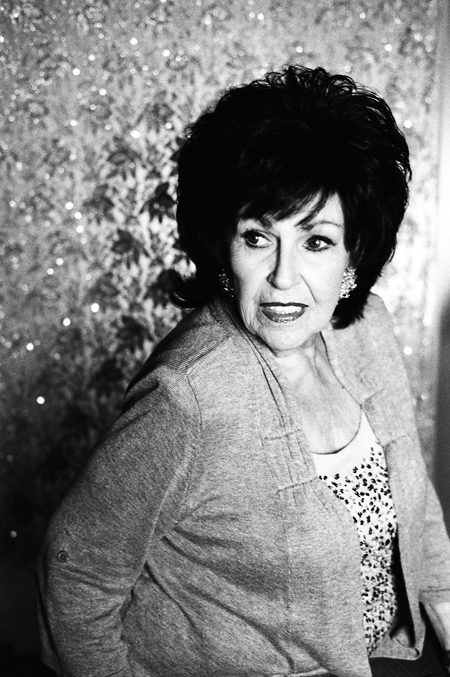Videos by American Songwriter
“It’s always strange to be in Nashville and hear all these British accents,” says Wanda Jackson, who is sitting for a photographer at the Third Man Records studio. “You’ve heard of the singing nun?” she jokes, modestly pulling up her gray cardigan as it starts to slip below her shoulders.
Wanda’s husband Wendell Goodman, who is also her manager, shuffles in, querying a publicist, “You know Jack can do that Opry thing?”
“I’ll get right on that,” the young man replies, assuredly.
“We’d better go…” Wendell says trailing off and ushering the two of them out of the room to discuss in more detail.
Third Man Records, Jack White’s complex, is located on a divey, industrial stretch in downtown Nashville. In the distance, you can see the construction work for the city’s controversial new mega convention center. But here, at Third Man headquarters, it feels like it could be 1956. The company’s offices, which fill in the space between Third Man’s record store front on 7th Avenue and a music venue space adjoining the alleyway behind the building, is all ‘50s modern furniture, vibrant colored Eames chairs and taxidermy mounts. Some of the walls are painted white and red with emergency room crosses. It’s a beehive of activity, with managers, staff, publicists and interns milling about.
Amid the bustle stands Wanda Jackson, The Queen of Rock, who’s enjoying a bit of a ‘50s revival herself. The innocence of that period in American history, she says, is drawing young people to her music today.
“These days, it just seems like the whole world is rushing on a train to nowhere,” Jackson says. “Our lifestyle in the ‘50s, we could be teenagers, we didn’t have to work two jobs. We were just kids living at home, mostly just having a good time.”
“A lot of the crowds that come out to see me dress in vintage clothes,” she says about her new fans. The ‘50s, she says, “holds a mystique” on the younger generations.
Wanda Jackson was the first female singer of the buttoned-up Decade of Conformity to growl into the microphone and wear short fringe skirts on stage.
“I don’t know too many female names in the rock and roll world that come before her,” says Jack White. “I think she’s extremely important, especially for women, in breaking down those barriers early on.”
For White, working with Wanda Jackson is a way of reconnecting to that time period.
“There was a time when local cities would have local hits in rock and roll,” White says, referring to music centers like Cleveland and Detroit. “The world is becoming a village with the Internet. Mass communication and technology is the destroyer of culture and local regions. When your environment is global, it’s a lot harder to have that electricity. It has to come from a neighborhood; it has to come from a place.”
White equates the idea of rock and roll largely to electricity, of capturing the moment versus having to create something. (It’s also symbolic of his proclivity for analog and distaste for digital.)
Wanda Jackson, originally from Oklahoma City, started out in country music. “I was a little feisty on stage,” she says, and that led Elvis Presley, whom she’d been touring with (and also dating), to push her toward the new genre of rockabilly.













Leave a Reply
Only members can comment. Become a member. Already a member? Log in.